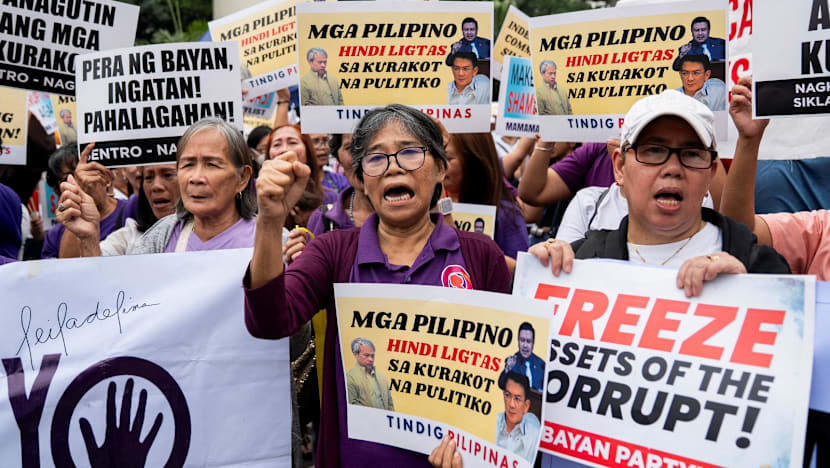Politics
Filipinos Face Corruption Crisis Amid Political Polarization

Amid ongoing political polarization, the Philippines grapples with a significant corruption scandal involving an estimated US$17.5 billion misappropriated from flood control projects. This issue was publicly highlighted by President Ferdinand Marcos Jr during his State of the Nation Address in July. Despite the scale of the controversy, public response has largely remained muted, with most expressions of outrage confined to social media rather than manifesting in large-scale protests.
In recent weeks, similar frustrations have sparked protests in Indonesia and Nepal, driven primarily by Generation Z activists. These events have showcased the potential for rapid mobilization among young people in response to perceived injustices. In contrast, the Filipino public’s reaction to the current scandal has been notably subdued, raising questions about the underlying factors at play.
Historically, the Philippines has seen large-scale protests aimed at addressing corruption and abuses of power. Notably, the nation has inspired similar movements globally. Yet, the current atmosphere is marked by a sense of resignation, as many citizens prioritize economic survival and daily responsibilities over political activism. This reluctance to engage is compounded by a deeply polarized political landscape, with factions aligned to both the Marcos and Duterte families vying for influence.
Currently, numerous groups are planning separate protests on September 21, 2023, rather than unifying under a single banner. This lack of coordinated action weakens the potential impact of public demonstrations. Political and business elites implicated in the scandal remain ambiguous in their affiliations, further complicating the public’s ability to mobilize effectively.
Civil society organizations and progressive politicians critical of both political dynasties are attempting to galvanize public sentiment. They are calling for accountability and transparency in government operations. Yet, the absence of a cohesive national consensus on how to address corruption leaves the public vulnerable.
Public apathy risks entrenching the country in its lower-middle-income status. Tolerance of corruption can hinder economic growth, while a lack of trust in political institutions may deter foreign investment. Filipinos expect a more decisive approach from their government, demanding that those responsible for the ongoing corruption be held accountable.
In response to the growing demand for transparency, leadership changes in the Senate and the House of Representatives have occurred, reflecting the serious nature of the allegations against legislators. These adjustments must be seen as initial steps towards accountability rather than mere political maneuvering.
The establishment of the Independent Commission on Infrastructure (ICI) is a notable development, but it remains to be seen whether this initiative will be enough to satisfy public expectations. The administration should consider lifting restrictions on access to the Statement of Assets, Liabilities, and Net Worth for public officials to enhance transparency in governance.
The Filipino public has a unique opportunity to unite against corruption, potentially serving as a catalyst for significant political change. A successful anti-corruption campaign could foster a sense of solidarity in a country fragmented by political divisions.
This commentary draws insights from Dr. Alvin Ang, a professor at the Ateneo de Manila University, and Dr. Aries A. Arugay, a Visiting Senior Fellow and Coordinator of the Philippine Studies Programme at the ISEAS – Yusof Ishak Institute. The situation underscores the pressing need for a collective response to corruption, which could lead to a more unified and resilient society.
-

 Lifestyle3 months ago
Lifestyle3 months agoHumanism Camp Engages 250 Youths in Summer Fest 2025
-

 Sports3 months ago
Sports3 months agoDe Minaur Triumphs at Washington Open After Thrilling Comeback
-

 Business4 months ago
Business4 months agoKenvue Dismisses CEO Thibaut Mongon as Strategic Review Advances
-

 Sports4 months ago
Sports4 months agoTupou and Daugunu Join First Nations Squad for Lions Clash
-

 Top Stories4 months ago
Top Stories4 months agoColombian Senator Miguel Uribe Shows Signs of Recovery After Attack
-

 World4 months ago
World4 months agoASEAN Gears Up for Historic Joint Meeting of Foreign and Economic Ministers
-

 Business4 months ago
Business4 months agoOil Prices Surge Following New EU Sanctions on Russia
-

 Health3 months ago
Health3 months agoNew Study Challenges Assumptions About Aging and Inflammation
-

 Entertainment3 months ago
Entertainment3 months agoDetaşe-Sabah Violin Ensemble Captivates at Gabala Music Festival
-

 Entertainment3 months ago
Entertainment3 months agoBaku Metro Extends Hours for Justin Timberlake Concert
-

 Business4 months ago
Business4 months agoU.S. House Approves Stablecoin Bill, Sends to Trump for Signature
-

 Top Stories4 months ago
Top Stories4 months agoRethinking Singapore’s F&B Regulations Amid Business Closures









